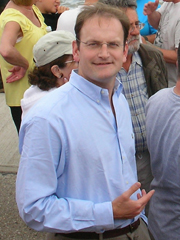How State Lotteries Make Markets Less Efficient
Anti-Statism, Business, Finance, StatismSomeone sent me a link to this paper yesterday.
Prof. Harris argues that skilled traders, who consistently profit, do so by taking money from people who trade for extrinsic reasons, to hedge risks, increase their savings, or simply to gamble for entertainment. He then points out an interesting implication:
If gamblers do indeed contribute to market quality in the long run by subsidizing information acquisition, an intriguing argument can be made about public lotteries. Lotteries would appear to compete with financial markets for gamblers willing to lose money. Lottery gamblers subsidize the state through their voluntary participation in a negative-sum game. Financial market gamblers subsidize productive information acquisition. Perhaps prices, and ultimately economic production, would be more efficient if gamblers gambled exclusively in the financial markets.
So there you have it — state lotteries make us worse off by wasting gambling money that would otherwise be productively spent.
How State Lotteries Make Markets Less Efficient Read Post »

